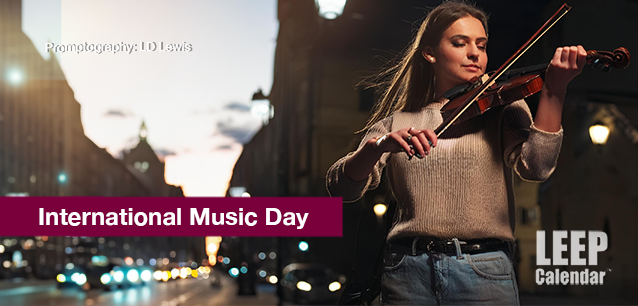 AD
AD
Today is: November 05
Scroll to explore events active on this date.
Additional Events on LEEP
LEEP INK FEATURES

August? Absolutely!
In August, we live through the Dog Days of Summer. It's hot and often humid, and those who can leave for better climates do. Down south, winter is in full force. August is also known as "the ...

In The Heat of July: July 2025 Events
Is it hot enough (or cold enough if you're below the equator) for you yet? There is actually a day for that! Like every month, I pick a diverse collection of events you may or may not know about. This ...

May Blooms: Events in May 2025
Along with October, May is one of the most densely packed months of the year. It's before the summer humidity and the last whole month of the school year. The weather is warming in t...
About International Music Day
Entertainment
Ends: Oct 01, 2025
DESCRIPTION:
CELEBRATING GLOBAL HARMONY:
INTERNATIONAL MUSIC DAY
International Music Day, observed annually on October 1st, is a global celebration dedicated to the unifying power of music. The day aims to promote music in all forms, foster cultural exchange, and encourage the appreciation of music as a universal language. Established in 1975 by the International Music Council (IMC), a non-governmental organization founded by UNESCO, International Music Day reminds us of music's role in bringing people together, regardless of their cultural or social backgrounds.
The International Music Council is the principal organization behind the event, with support from various national music councils, cultural institutions, and music enthusiasts worldwide. The IMC's mission is to create access to music for all and to affirm music's role in the artistic development of societies.
Participation in International Music Day is widespread and diverse. People across the globe engage in a variety of activities, including concerts, music workshops, and public performances. Amateur and professional musicians are encouraged to share their talents, whether through live performances, online streaming, or community events. Schools and educational institutions often host music-related activities, promoting the importance of music education and encouraging students to explore different instruments and genres.
TYPES OF INSTRUMENTS
The piano, guitar, violin, and drums are among the most popular instruments worldwide due to their roles in various musical genres, from classical to contemporary.
Typically, instruments fall into four main categories:
—String Instruments:
These include instruments like the violin, guitar, and cello, where sound is produced by vibrating strings.
—Wind Instruments:
This category includes flutes, clarinets, and trumpets, which generate sound by the movement of air through the instrument.
—Percussion Instruments:
Instruments such as drums, xylophones, and tambourines fall into this category, where sound is produced by striking or shaking.
—Keyboard Instruments:
The piano and organ are prime examples. Sound is produced by pressing keys that trigger strings or air pipes.
Learning an instrument can be difficult depending on an individual's background, physical ability, and musical experience.
The piano is often considered one of the most accessible instruments to learn, especially for beginners. Its layout is intuitive, providing a clear visual representation of musical notes, making it accessible for those new to music.
On the other hand, the violin is frequently cited as one of the most challenging instruments to master. It requires precise finger placement, bowing technique, and a good ear for pitch, which can take years to develop.
International Music Day celebrates the joy of making and listening to music and encourages people of all ages to pick up an instrument and experience the satisfaction of creating music. Whether one is just starting or is a seasoned musician, this day offers an opportunity to explore the diverse world of music and to connect with others through this universal art form.
VIDEOS
SUPPORTING DOCUMENTS
Currently, this event does not have supporting documents.
ADDITIONAL IMAGES
Currently, this event does not have supporting images.
Where would you like to go now?
 AD
AD


/footer-logo.svg)
